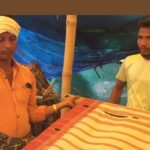This is a story about the power of exposure trips on young development professionals.
We set out in a large vehicle on a mildly cold day in December. It was 2018 and I was accompanying a group of tribal women farmers from the remote villages of the Rajnandgaon district in Chhattisgarh on their first trip out of their district.
In fact, for most it was the first time they had left their village.
A first-time trip outside the village
From the train journey to visiting other villages in the neighbouring state of Odisha, I was overwhelmed by the women’s reaction to their newly found freedom to experience life in a different way.
It felt as if they were gradually accepting their newly found – though time-bound – liberty, then began to embrace until finally, wholeheartedly, celebrating it.
I wondered how I had always taken my ability to travel freely for granted.
The privileges of being an educated, middle-class woman in urban India
As a woman, I feel a strong connection with other women. I know the limitations I’ve been able to overcome through a range of opportunities that have paved the way for who I am today. But I’m also well aware of my privileges as an educated, middle-class woman living in India’s capital.
Despite these fundamental differences, I felt a deep empathy and compassion for these women. I felt I understood them and their unfulfilled aspirations. Weren’t my dreams closely intertwined with theirs? I accepted our outcomes would be distinct, but our dreams felt linked.

Exposure trip and the beauty of music, despite linguistic differences
The best music I’ve ever heard in my life was these women – out of their village for the first time in their lives – singing their hearts out as we drove from one site to another in search of new hope and dreams. The melodious joy of their freedom and exploration engulfed me then and still does today.
Their language has very few intersections with mine, but that didn’t deter our communication. An honest exchange of experiences deepened and nurtured our connection. We narrated our life stories and explored the parallels and juxtapositions.
Though the social structures we were part of had similar foundational beliefs, what governed our lives was the function of our caste identity, how educated our families were, growth opportunities and so much more that we chose to blame on samaaj (society). We acknowledged the differences and bonded over our womanhood.
But, really, we preferred focusing on the trip – the first chance they had to discover new opportunities and unimagined possibilities that didn’t limit them to their social boundaries alone. Because it was obvious how they were highly dependent on externalities for enhancing their life experiences.
The most powerful moment of the exposure trip
The most powerful moment came when we went to a far-off Odisha village in the Koraput district to meet a women’s producer group that was also running and managing a millets processing unit. We’d specifically planned this meeting because of the similarities between the villages in Rajnandgaon and Koraput.

Yet we were surprised at what happened when we concluded the formal discussion and the women from both communities began to dance and sing.
That was not all.
Even the men and children joined the impromptu celebration. Someone played drums and other instruments, more native to tribals. Then the women from Odisha took the Chhattisgarh women to their homes, showed them their kitchens, storage spaces for millets as well as their decorative knick-knacks and art. The Chhattisgarh women invited their hosts to come and visit them in their villages. Some even exchanged phone numbers.
Seeing these two groups of women transcend all boundaries to create a unified identity brought me immense happiness.
Exposure trip in rural Chattisgarh: Reflections
To this day, I still carry this trip close to my heart – both personally and professionally.
As a young development professional, this trip helped me realise how gender mainstreaming needs to be magnified if we’re to bring the transformative change we aspire to bring in our own lives and those of others.
It was the first time for the local government’s agricultural department to organise an exposure trip for women farmers. So, it was not easy for the staff – or for the community – to imagine women going on such a visit.
But what we all learned, saw and experienced through this process was enriching. It was living proof of what Nobel Prize winning economist Amartya Sen expresses in his book Development as Freedom, “(It is) the enhancement of freedoms that allow people to lead lives that they have reason to live.”
Truly, the essence of development lies in expanding both people’s freedom and opportunities.
Ankita Goyal is the State Programme Officer (Farm Livelihoods) at Transform Rural India Foundation.








